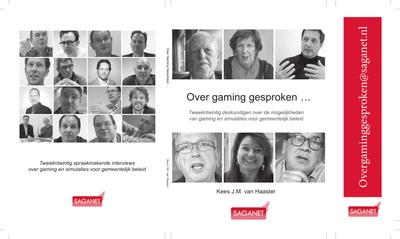Korte interviews met deskundigen over de kracht van simulaties en gaming voor openbaar bestuur en gemeentelijk beleid. Voorwoord van Annemarie Jorritsma, voorzitter van de Vereniging van Nederlandse Gemeenten
DOCUMENT

Background: Revealing tacit knowledge often is seen as very valuable for organizations, although it is usually challenging to enunciate and share this type of knowledge. Methods: This study uses a participatory design and the application of a board gaming simulation as instruments to extract tacit knowledge. To illustrate this application, the gaming simulation is played with entrepreneurs from horticulture. Horticulture represents a complex social system where tacit knowledge plays a major role in the trade process. A participatory design process is used to explore whether the design and play of gaming simulations enable participants to explicate their tacit knowledge. Participants’ participation in designing the gaming simulation explicated that reconstructing reality was a prerequisite for their commitment. Results: The results from playing simulation sessions show that participants were able to: (1) narrow down the anecdotic behaviour to a few factors; (2) to structure these factors; (3) explore how these factors relate to trade barriers and (4) to explain which tactics are applied to foster trade. Conclusion: The educational value of this study is that it helped entrepreneurs in understanding complex real-life situations.
MULTIFILE

Gaming Horizons is a EU-funded project that explored the role of video games in culture, the economy and education. We engaged with more than 280 stakeholders through interviews, workshops and webinars.
LINK
Gaming Horizons is a EU-funded project that explored the role of video games in culture, the economy and education. We engaged with more than 280 stakeholders through interviews, workshops and webinars.
LINK
Gaming Horizons is a EU-funded project that explored the role of video games in culture, the economy and education. We engaged with more than 280 stakeholders through interviews, workshops and webinars.
LINK
Gaming Horizons is a EU-funded project that explored the role of video games in culture, the economy and education. We engaged with more than 280 stakeholders through interviews, workshops and webinars.
LINK
Gaming Horizons is a EU-funded project that explored the role of video games in culture, the economy and education. We engaged with more than 280 stakeholders through interviews, workshops and webinars.
LINK
Gaming Horizons is a EU-funded project that explored the role of video games in culture, the economy and education. We engaged with more than 280 stakeholders through interviews, workshops and webinars.
LINK
A case study and method development research of online simulation gaming to enhance youth care knowlegde exchange. Youth care professionals affirm that the application used has enough relevance as an additional tool for knowledge construction about complex cases. They state that the usability of the application is suitable, however some remarks are given to adapt the virtual environment to the special needs of youth care knowledge exchange. The method of online simulation gaming appears to be useful to improve network competences and to explore the hidden professional capacities of the participant as to the construction of situational cognition, discourse participation and the accountability of intervention choices.
DOCUMENT

Gaming Horizons is a EU-funded project that explored the role of video games in culture, the economy and education. We engaged with more than 280 stakeholders through interviews, workshops and webinars.
LINK